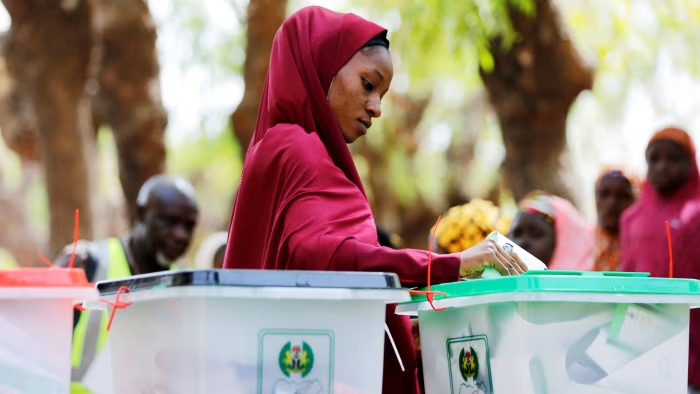


Dark Mode
Turn on the Lights

The European Union (EU) has warned that Nigeria’s democracy could slide into crisis ahead of the 2027 general elections unless urgent and comprehensive electoral reforms are implemented. Speaking in Abuja last week, Barry Andrews, head of the EU Election Follow-Up Mission and former chief observer of the 2023 elections, said progress on reform has been […]

The European Union (EU) has warned that Nigeria’s democracy could slide into crisis ahead of the 2027 general elections unless urgent and comprehensive electoral reforms are implemented. Speaking in Abuja last week, Barry Andrews, head of the EU Election Follow-Up Mission and former chief observer of the 2023 elections, said progress on reform has been “modest at best and dangerously close to stagnation.”
According to the mission’s assessment, Nigeria has implemented only one of the 23 priority recommendations issued by the EU after the disputed 2023 polls. Two others are partially adopted, eight remain ongoing, nine have not been touched, and three are too early to assess. “The window for meaningful change is closing fast,” Andrews warned. “Unless these reforms are concluded within the next few months, there is a risk of repeating the serious shortcomings of 2023.”
Those shortcomings remain vivid in public memory. The 2023 general elections, hailed as a test of Nigeria’s maturing democracy, were mired in operational failures and allegations of rigging. INEC’s much-touted Bimodal Voter Accreditation System, which was expected to transmit results from polling units in real time, faltered during the presidential vote. Collation shifted back to manual methods, results trickled in slowly, and suspicions of manipulation took hold before the official tallies were announced.
Opposition parties — led by Atiku Abubakar of the PDP and Peter Obi of the Labour Party — challenged the results, alleging irregularities and non-compliance with the law. The judiciary ultimately upheld Bola Tinubu’s victory, but the prolonged legal battle deepened divisions and eroded confidence in the electoral process. Voter turnout, already at historic lows, slumped to less than 30 percent, with analysts reporting that the figure reflects a growing fatigue among Nigerians who no longer believe their votes carry weight.
Against that backdrop, the EU’s renewed scrutiny strikes a nerve. The Follow-Up Mission, invited by Nigeria to assess post-election progress, highlighted six areas requiring urgent action: open and merit-based appointments within INEC, simultaneous electronic and manual publication of results, legal clarity through the Electoral Act Amendment Bill, stronger protection for journalists, creation of an Independent Electoral Offences Commission, and passage of the Reserved Seats Bill to increase women’s representation. The mission also raised concerns about recent judicial interpretations that both manual and electronic collation must be applied, warning that such contradictions could complicate future results transmission.
Andrews rejected accusations that the EU was meddling in Nigeria’s internal affairs. “This is about democracy for Nigerians, not outsiders,” he told reporters. “Civil society has made these same demands. Nigeria itself has observed elections in Ireland. This is reciprocity, not intrusion.”
Gautier Mignot, the EU’s ambassador to Nigeria and ECOWAS, reinforced that point, stressing that implementation rests squarely with Nigerian authorities. He clarified that recent diplomatic visits to off-cycle elections should not be mistaken for full EU observation missions, which involve larger delegations and deeper assessments.
INEC, for its part, has appealed to the National Assembly to fast-track the passage of the Electoral Act Amendment Bill as part of the constitutional review process. INEC Chair Mahmood Yakubu stated that the commission needs legal certainty to plan effectively for 2027, warning that delays could “unsettle preparations and repeat the confusion that marred 2023.” The commission has received three EU follow-up missions since 2015 and says it welcomes continued engagement, though Yakubu maintains that “the responsibility for credible elections rests primarily with Nigerians themselves.”
Still, the EU report underscores a wider truth that Nigerian observers have echoed for years: INEC alone cannot repair the system. Many of the structural problems that discredited 2023 — from political interference to the lack of prosecutions for electoral offences — fall within the purview of the legislature, the executive, and the judiciary. A 2023 post-election review by INEC itself identified 142 internal improvements, but most of the EU’s recommendations extend beyond the commission’s control. Without reforms across all branches of government, the credibility of any future vote remains in question.
From all indications, the upcoming appointment of a new INEC chair will serve as an early test of political will. Transparent and merit-based selection could restore some confidence; a politically motivated appointment could poison the process before it begins. “The appointment of the INEC chair is the first test of our seriousness,” argues political commentator, Dakuku Peterside. “Handle it with transparency and the public might lean in; politicise it, and faith in 2027 evaporates before the starter’s pistol fires.”
The EU’s message, ultimately, is less about external pressure than about timing. The bloc recognizes that Nigeria has shown flashes of legislative momentum — through the 2025 Electoral Amendment Bill and the ongoing constitutional review — but cautions that progress without urgency risks becoming performance. “Democratic resilience depends on reforms that citizens can believe in,” Andrews said.
Nigeria’s challenge now is to move from acknowledgement to action. The memories of 2023 are too raw, and the political temperature ahead of 2027 is already rising. Without real reform, observers warn, the next election could be marred not only by technical failings but by a deeper legitimacy crisis.
For now, the EU’s follow-up mission has done what international partners often do: hold up a mirror. It reflected what Nigerians already know — that the credibility of their democracy will not be measured by promises, but by how quickly those promises are turned into law. The question is whether the country’s leaders are prepared to look into that mirror and act before time runs out.
